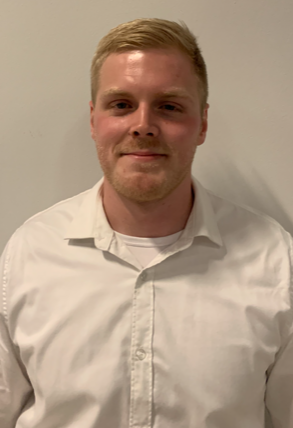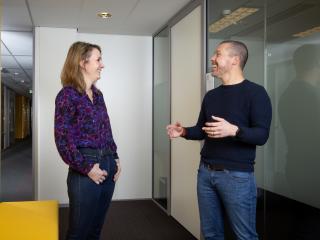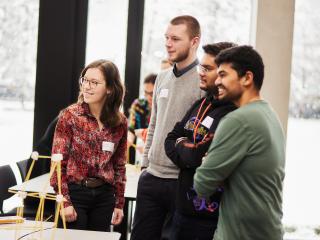Research on migrant workers: How to increase their job satisfaction
In the past few months, several Human Resource Studies Masters’ students at Tilburg University have conducted research on migrant workers. In today's tight labor market, they are becoming increasingly important. But how do they feel about working in the Netherlands and what do they consider important in this regard? These are some of the subjects of the Master’s theses by Bo Kamstra, Joost Langedijk, Ine Grootenboer, and Anne van den Tillaar. They were supervised by Brigitte Kroon (Human Resource Studies) and Jan Cremers (Law School and Migrant Workers Expert Center). In this article, they look back on the results of their interdisciplinary studies and what they learned in the process.
Dataset as basis
The basis of their research was a database of the Migrant Workers Expert Center (Kenniscentrum Arbeidsmigranten). In the course of 2021, it administered a series of questionnaires to a large and diverse group of migrant workers in the Netherlands. The students used these data as a basis for their separate studies. Anne: ‘In fact what we did was reverse the process of choosing a subject for graduation. We did not follow the standard procedure, as in: choose a research question and find relevant data. We took the opposite approach: we had this specific dataset and investigated what interesting research questions it presented.’
Intersectionality as the common thread
An important concept in all these studies is intersectionality, an approach whereby people’s various characteristics (for instance, a person’s sex, age, and labor participation) are studied simultaneously and in connection with each other. Multiple characteristics can play a role in a research question and mutually affect each other. For that purpose, several of these aspects were examined in combination in these studies. Joost: ‘When you add another aspect, for instance, education or sex, that may affect the outcome of your study.’
Research result 1: The better migrant workers are integrated, the less satisfied they are about their jobs
Bo: ‘I studied the correlation between the extent to which migrant workers were integrated in society and their satisfaction with their jobs. There proved to be a negative correlation between the two: the better a migrant worker is integrated, the less satisfied he is about his job. One possible explanation is that migrant workers who have recently arrived in the Netherlands compare their situation with that in their home country, whereby the new situation and the new wage seem to an improvement at first. The longer they are here and the better they become integrated, the more aware they are of the work the Dutch consider normal, which makes them more critical of their own jobs. This effect was observed for all those who participated in the study.

I did not find any significant difference as regards age, sex, or type of labor agreement. Employers can improve migrant workers’ job satisfaction, among other things, by offering a better and more transparent HR policy.’
Research result 2: Low-skilled migrant workers in precarious jobs experience the lowest well-being
Joost: ‘My study went deeper into the combination of education level, sex, and migrant workers’ subjective wellbeing. I also investigated the role of uncertainty in the working condition. My research shows that low-skilled migrant workers are most likely to experience uncertain working conditions. And the lowest wellbeing. Women are an exception: they experience uncertainty in their working conditions but a higher wellbeing. A possible explanation is that they have often come to the Netherlands with their entire family. Men are more likely to emigrate alone, as a result of which they may experience more loneliness and lower wellbeing because they are separated from their families. Non-European migrant workers experience less precarious working conditions than European migrant workers.

That can also be explained because they have to apply for a work permit immediately and experience more security than European migrant workers, who only need to apply for such a work permit after four months and may remain longer in uncertainty as a result.’
Research result 3: Highly educated migrant workers are dissatisfied with unsuitable work

Anne: ‘In my study, I investigated the relationship between the education level of migrant workers, their job satisfaction, and the intention to leave the Netherlands. It showed that migrant workers who are better educated than is necessary for the work they do are less satisfied with their jobs and are more likely to think about changing jobs or even leaving the Netherlands. This effect is stronger for women than for men. This may be caused by the fact that men are traditionally breadwinners in their country of origin. Women who work abroad do so consciously and may therefore have higher expectations of their jobs. This is a clear signal to employers and policy makers to put more effort in jobs that are a good match. If migrant workers have a job that is a good fit, their job satisfaction rises and we can retain their talents for our country.’
Research result 4: HRM has little focus on the sustainable employability of migrant workers

Ine: ‘I looked at the relationship between the employability of migrant workers and the types of employment contracts they have. They showed that organizations hardly invest in the development and sustainable employability of migrant workers. This applies in particular for migrant workers on a temping contract. They do get instructions on how to do the work, but they do not get any language training or a different kind of course that can help them ahead in the future. I did not find any differences between men and women in this respect. My study shows that organizations could do more about inclusion. Especially temping agencies should invest more in mediating between migrant workers and hiring companies, whereby attention is also paid to the development and future employability of migrant workers.
The workers indicate that they have enough qualifications to move up the ladder, but they must be given the chance, so they can achieve their full potential for their employer.’
A topical and socially relevant issues
The students have consciously chosen to do research on intersectionality and migrant workers.
Joost: ‘Intersectionality is a relatively new concept. It seemed interesting and challenging to me to take that on. The situation of migrant workers in the Netherlands is also a topical and socially relevant issue and that appealed to me, too.’
Anne: ‘I myself live in an area with a lot of agriculture and horticulture, where many migrant workers find work. It seemed interesting to me to discover how they feel about the Netherlands and to explore ways to improve their situation.’
Ine: ‘In my own organization, I also see that migrant workers often go unnoticed by the HRM department. I hope that my research contributes to companies realizing that they are passing up opportunities here.’
Bo: ‘This study gave me the opportunity to create awareness of the situation of migrant workers and to show what we can do to improve that situation. If my study contributes only a little to better working conditions, that would make me very happy.’
You all get to the point where you think: what have I gotten myself into?
Anne van den Tillaar
Good collaboration
For their research, the students worked together closely with each other and their supervisors. They used the dataset of the Migrant Workers Expert Center, which also provided support.
Anne: ‘The collaboration with the Migrant Workers Expert Center was instructive. Jan Cremers, our contact there, critically followed our studies and gave feedback that was very helpful to us. You all get to the point where you think: what have I gotten myself into? It is important not to let yourself be discouraged. It helped that we were in the process together.’
Bo: ‘We worked together in a very good way and read about and discussed each other’s studies. That was instructive, even though we were working on completely different questions and variables. It was good to see how the others made progress and continued to improve their study. The collaboration with our supervisors was great, too.’
Ine: ‘Because we all worked with the same data, we were able to join forces and provide input. Sometimes it is very helpful to be able to brainstorm together on possible explanations of the findings suggested by your research. We were also able to combine our questions to the Migrant Workers Expert Center to work more efficiently.’
Joost: ‘We were able to present our results to a group of experts from the field. That was very instructive for us, but certainly also for them. We gathered so much knowledge in a few months’ time that we were in fact able to teach them a few things that were new to them.’
Thanks to my research, I have become more aware of the invisible position of migrant workers
Ine Grootenboer
A useful lesson for the future
Anne, Bo, Ine, and Joost have now graduated and look back on an exciting and educational course of studies.
Bo: ‘My research was truly a reality check. I have worked as an HR professional since the beginning of this year and know now how important it is to reward people equally and be transparent about this. It is a good thing that things are shifting here and that something is being done about unjustified pay inequality.’
Ine: ‘Thanks to my research, I have become more aware of the invisible position of migrant workers. Given my present role as an HR assistant, I would like to do something about it. During my studies, I learned useful skills that I can put to good use in my work.’
Joost: ‘I gained a lot of knowledge through my research. It has given me new insights, that will certainly help me in my future work in HR. But now I am going to work as a lifeguard in Zeeland for six months before I dive into HR.’
Anne: ‘This research experience taught me to build on other people’s knowledge, making smart use of what is already available. What is more, it gave me insight into myself. You really learn something about yourself during such an intensive process. It teaches you to pull yourself together and to persevere. That will certainly be a great benefit to me in the future.’
Also in Tilburg University Magazine
Date of publication: 26 April 2023



